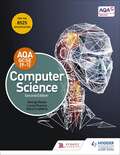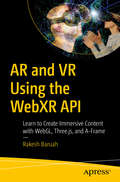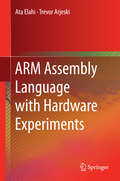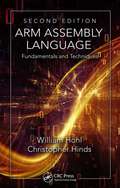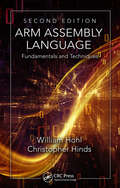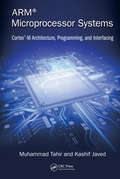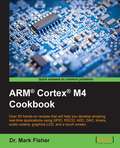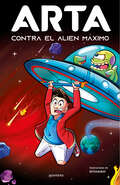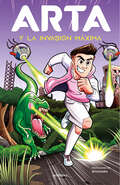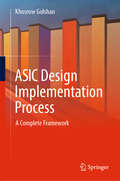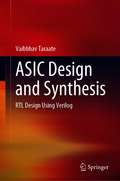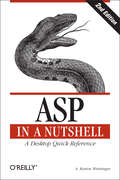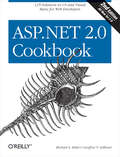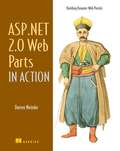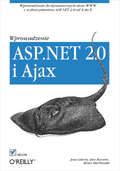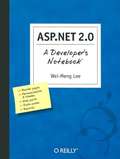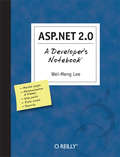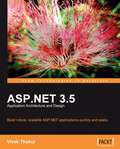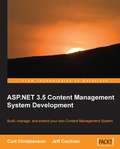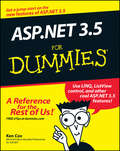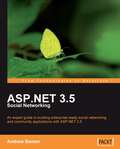- Table View
- List View
AQA GCSE Computer Science, Second Edition
by George Rouse Ian Paget Gavin Craddock Lorne PearceyUpdated specification; first teaching September 2020. Specification code: 8525Written by leading Computer Science teachers, this textbook will guide students through the updated AQA GCSE Computer Science specification topic by topic, and provide them with standalone recap and review sections, practice questions, worked examples and clear explanations of complex topics.This textbook:>> Prepares students for assessment with numerous practice questions for all topics>> Develops computational thinking skills>> Provides differentiated material with the 'beyond the spec' feature>> Includes standalone recap and review sections at the end of each chapter>> Provides definitions of technical terms, along with a glossary of words to ensure students feel confident with the assessment.AuthorsGeorge Rouse, Lorne Pearcey and Gavin Craddock are highly respected and widely published authors of resources.
AR and VR Using the WebXR API: Learn to Create Immersive Content with WebGL, Three.js, and A-Frame
by Rakesh BaruahGain an in-depth knowledge in immersive web development to create augmented reality (AR) and virtual reality (VR) applications inside web browsers using WebXR API, WebGL, Three.js, and A-Frame. This project-based book will provide the practice and portfolio content to make the most of what the futures of spatial computing and immersive technology have to offer.Beginning with technical analysis of how web browsers function, the book covers programming languages such as WebGL, JavaScript, and HTML, with an eye on a complete understanding of the WebXR lifecycle. You'll then explore how contemporary web browsers work at the code level and see how to set up a local development server and use it with the Visual Studio Code IDE to create 3D animation in the WebGL programming language. With a familiarity of the web-rendering pipeline in place, you’ll venture on to WebGL abstractions such as the Three.js JavaScript library and Mozilla’s A-Frame XR Framework, which use WebXR to create high-end visual effects. In the final projects of the book, you’ll create an augmented reality web session for an Android phone device, and create a VR scene in A-Frame (built on Three.js) to demo essential components of the WebXR API pertaining to user positioning and interaction.Game engines have become common-place for the creation of mixed reality content. However, developers not interested in learning entirely new workflows may be better suited to work within a medium almost universally open to all—the web; AR and VR Using the WebXR API will show you the way.What You'll LearnMaster the creation of virtual reality and augmented reality features for web pagePrepare to work as an immersive web developer with a portfolio of projects in sought-after technologiesReview the fundamentals of writing shaders in WebGLExperience the unity between client, server, and cloud architecture as it applies to location-based ARWho This Book Is ForAspiring immersive web developers and developers already familiar with the fundamentals of web development who want to further explore topics such as spatial computing, computer vision, spatial anchors, and cloud-computing for multi-user social experiences.
ARM Assembly Language with Hardware Experiments
by Ata Elahi Trevor ArjeskiThis book provides a hands-on approach to learning ARM assembly language with the use of a TI microcontroller. The book starts with an introduction to computer architecture and then discusses number systems and digital logic. The text covers ARM Assembly Language, ARM Cortex Architecture and its components, and Hardware Experiments using TILM3S1968. Written for those interested in learning embedded programming using an ARM Microcontroller.
ARM Assembly Language: Fundamentals and Techniques
by William Hohl Christopher HindsDelivering a solid introduction to assembly language and embedded systems, ARM Assembly Language: Fundamentals and Techniques, Second Edition continues to support the popular ARM7TDMI, but also addresses the latest architectures from ARM, including Cortex™-A, Cortex-R, and Cortex-M processors―all of which have slightly different instruction sets, programmer’s models, and exception handling.
ARM Assembly Language: Fundamentals and Techniques, Second Edition
by William Hohl Christopher HindsDelivering a solid introduction to assembly language and embedded systems, ARM Assembly Language: Fundamentals and Techniques, Second Edition continues to support the popular ARM7TDMI, but also addresses the latest architectures from ARM, including Cortex�-A, Cortex-R, and Cortex-M processors-all of which have slightly different instruction sets, p
ARM Microprocessor Systems: Cortex-M Architecture, Programming, and Interfacing
by Kashif Javed Muhammad TahirThis book presents the use of a microprocessor-based digital system in our daily life. Its bottom-up approach ensures that all the basic building blocks are covered before the development of a real-life system. The ultimate goal of the book is to equip students with all the fundamental building blocks as well as their integration, allowing them to implement the applications they have dreamed up with minimum effort.
ARM® Cortex® M4 Cookbook
by Dr Mark FisherOver 50 hands-on recipes that will help you develop amazing real-time applications using GPIO, RS232, ADC, DAC, timers, audio codecs, graphics LCD, and a touch screen About This Book * This book focuses on programming embedded systems using a practical approach * Examples show how to use bitmapped graphics and manipulate digital audio to produce amazing games and other multimedia applications * The recipes in this book are written using ARM's MDK Microcontroller Development Kit which is the most comprehensive and accessible development solution Who This Book Is For This book is aimed at those with an interest in designing and programming embedded systems. These could include electrical engineers or computer programmers who want to get started with microcontroller applications using the ARM Cortex-M4 architecture in a short time frame. The book's recipes can also be used to support students learning embedded programming for the first time. Basic knowledge of programming using a high level language is essential but those familiar with other high level languages such as Python or Java should not have too much difficulty picking up the basics of embedded C programming. What You Will Learn * Use ARM's uVision MDK to configure the microcontroller run time environment (RTE), create projects and compile download and run simple programs on an evaluation board. * Use and extend device family packs to configure I/O peripherals. * Develop multimedia applications using the touchscreen and audio codec beep generator. * Configure the codec to stream digital audio and design digital filters to create amazing audio effects. * Write multi-threaded programs using ARM's real time operating system (RTOS). * Write critical sections of code in assembly language and integrate these with functions written in C. * Fix problems using ARM's debugging tool to set breakpoints and examine variables. * Port uVision projects to other open source development environments. In Detail Embedded microcontrollers are at the core of many everyday electronic devices. Electronic automotive systems rely on these devices for engine management, anti-lock brakes, in car entertainment, automatic transmission, active suspension, satellite navigation, etc. The so-called internet of things drives the market for such technology, so much so that embedded cores now represent 90% of all processor's sold. The ARM Cortex-M4 is one of the most powerful microcontrollers on the market and includes a floating point unit (FPU) which enables it to address applications. The ARM Cortex-M4 Microcontroller Cookbook provides a practical introduction to programming an embedded microcontroller architecture. This book attempts to address this through a series of recipes that develop embedded applications targeting the ARM-Cortex M4 device family. The recipes in this book have all been tested using the Keil MCBSTM32F400 board. This board includes a small graphic LCD touchscreen (320x240 pixels) that can be used to create a variety of 2D gaming applications. These motivate a younger audience and are used throughout the book to illustrate particular hardware peripherals and software concepts. C language is used predominantly throughout but one chapter is devoted to recipes involving assembly language. Programs are mostly written using ARM's free microcontroller development kit (MDK) but for those looking for open source development environments the book also shows how to configure the ARM-GNU toolchain. Some of the recipes described in the book are the basis for laboratories and assignments undertaken by undergraduates. Style and approach The ARM Cortex-M4 Cookbook is a practical guide full of hands-on recipes. It follows a step-by-step approach that allows you to find, utilize and learn ARM concepts quickly.
ARTA contra el alien máximo (Arta Game #Volumen 3)
by Arta Game¡Arta vivirá su misión más épica en un libro increíble a todo color! ¿Estás preparado para sobrevivir contra el alien máximo? ARTA ESTÁ EN PELIGRO. ¿SOBREVIVIRÁ CONTRA EL ALIEN MÁXIMO?El mundo ha sido invadido por un montón de extraterrestres. AL PRINCIPIO solo eran unos cuantos aliens. DESPUÉS llegaron más naves. Y AHORA muchos humanos se han pasado al bando de los extraterrestres.Arta y sus amigos tienen que hacer algo si quieren parar la invasión alienígena. Pero la única manera de acabar con los extraterrestres es derrotar al ALIEN MÁXIMO, y enfrentarse a ese monstruo verde puede significar el fin de todo. CADA PASO QUE DAN LOS ALIENS PONE EN PELIGRO EL PLANETA TIERRA... ¿CONSEGUIRÁN SOBREVIVIR Y DERROTAR AL ALIEN MÁXIMO ANTES DE QUE ARRASE CON TODO?
ARTA en el apocalipsis máximo
by Arta GameARTA ESTÁ EN PELIGRO. ¿SOBREVIVIRÁ AL APOCALIPSIS MÁXIMO? Adéntrate en el nuevo libro del youtuber del momento para descubrirlo. En la Tierra están pasando cosas extrañas:PRIMERO, los volcanes del mundo han entrado en erupción.DESPUÉS, ha habido un gran apagón.AHORA han aparecido bichos raros por todas partes. El mundo entero está en riesgo, y Arta y sus amigos tienen que huir del planeta si quieren sobrevivir. Pero no será nada fácil, aún menos cuando algunos de ellos desaparecen por el camino. Y si algo tiene claro Arta es que no piensa dejar a nadie atrás. Cada minuto que pasa es una oportunidad perdida de poder sobrevivir... ¿CONSEGUIRÁN RESISTIR AL FIN DEL MUNDO Y ESCAPAR A TIEMPO? ACOMPAÑA A ARTA GAME EN SU VIAJE MÁS ÉPICO¿Estás preparado para salvar al mundo del apocalipsis?
ARTA en la jungla máxima (Arta Game #Volumen 5)
by Arta GameARTA ESTÁ EN PELIGRO. ¿SOBREVIVIRÁ EN LA JUNGLA MÁXIMA? Un aparato que podría terminar con el apocalipsis ha sido encontrado. SIN EMBARGO, parece que está sin acabar. ADEMÁS, no se sabe dónde están los científicos rusos que lo crearon. Y PARA REMATAR, los extraterrestres vuelven a estar en la Tierra.Arta y sus amigos tienen que encontrar a los científicos como sea. Pero para conseguirlo deberán cruzar la jungla, escapar de un barco de contrabandistas y conseguir una avispa tan ultravenenosa que podría acabar con todo. CADA VEZ ESTÁN MÁS CERCA DE TERMINAR CON EL APOCALIPSIS. ¿CONSEGUIRÁN CUMPLIR SU MISIÓN ANTES DE QUE SE ACABE EL MUNDO?
ARTA y la invasión máxima (Arta Game #Volumen 2)
by Arta Game¡Arta vivirá su misión más épica en un libro increíble a todo color! ¿Estás preparado para sobrevivir a la invasión máxima? El avión en el que Arta viajaba ha tenido un accidente y ha aterrizado a un mundo demasiado extraño. PARA EMPEZAR, el cielo es morado.ADEMÁS, no hay rastro de gente.Y, PARA REMATAR, hay una grieta enorme en el cielo, de la que salen cosas peligrosísimas. Arta y sus amigos tendrán que enfrentarse a todo tipo de invasiones para sobrevivir. Dinosaurios hambrientos, ratas locas, abejas gigantes... Solo hay una manera de parar la invasión máxima: cerrar la grieta, aunque para hacerlo tengan que arriesgar sus vidas. CADA NUEVA INVASIÓN AMENAZA EL MUNDO ENTERO...¿CONSEGUIRÁN SOBREVIVIR Y FRENAR LA INVASIÓN ANTES DE QUE SEA DEMASIADO TARDE?
ASIC Design Implementation Process: A Complete Framework
by Khosrow GolshanThis book is an easy-to-read guide, providing a complete framework for the ASIC design process. Based on the author’s extensive experience leading ASIC design teams, this book emphasizes short, clear descriptions, supplemented by references to authoritative manuscripts. This approach presents the essence of the ASIC design implementation process for those involved in a specific part of the process, while providing knowledge of the entire process.
ASIC Design and Synthesis: RTL Design Using Verilog
by Vaibbhav TaraateThis book describes simple to complex ASIC design practical scenarios using Verilog. It builds a story from the basic fundamentals of ASIC designs to advanced RTL design concepts using Verilog. Looking at current trends of miniaturization, the contents provide practical information on the issues in ASIC design and synthesis using Synopsys DC and their solution. The book explains how to write efficient RTL using Verilog and how to improve design performance. It also covers architecture design strategies, multiple clock domain designs, low-power design techniques, DFT, pre-layout STA and the overall ASIC design flow with case studies. The contents of this book will be useful to practicing hardware engineers, students, and hobbyists looking to learn about ASIC design and synthesis.
ASP in a Nutshell: A Desktop Quick Reference
by Keyton WeissingerASP in a Nutshell provides the high-quality reference documentation that web application developers really need to create effective Active Server Pages. It focuses on how features are used in a real application and highlights little-known or undocumented features.This book also includes an overview of the interaction between the latest release of Internet Information Server (version 5) and ASP 3.0, with an introduction to the IIS object model and the objects it comprises. The examples shown in this section and throughout the book are illustrated in VBScript.The main components of this book are:Active Server Pages Introduction. Brief overview of the ASP application paradigm with examples in VBScript. Also included is an introduction to Microsoft's Internet Information Server 5.0, the IIS object model, and the objects that it comprises.Object Reference. Each object is discussed in the following manner: descriptions, properties, collections, methods, events, accessory files/required DLLs, and remarks, including real-world uses, tips and tricks, and author's experience (where applicable). The objects--Application, Response, Request, Server, Session, ObjectContext, and ASPError, as well as ASP Directives, Global.ASA, and Server-Side Includes--all follow this paradigm. Component Reference. This section follows the same paradigm found in Object Reference. The discussion covers all of the additional components included with IIS, such as ActiveX Data Objects, the Ad Rotator, the Browser capabilities component, the File System Object, and more.Appendixes. Gives examples in one or two objects and components using Perl, REXX, and Python in ASP.Like other books in the "In a Nutshell" series this book offers the facts, including critical background information, in a no-nonsense manner that users will refer to again and again. It is a detailed reference that enables even experienced web developers to advance their ASP applications to new levels.
ASP. NET Core MVC: Training and Reference
by Joel Murach Mary DelamaterIf you know the basics of C#, you're ready to learn how to create web applications using Microsoft's powerful technology, ASP.NET Core MVC (Model-View-Controller). And there's no more practical way to do it than with this book. <p><p> By the end of section 1...just 5 chapters...you'll be developing real-world web apps using C# code for the model and controller classes...HTML, CSS, and Razor code for the view files (for the user interface)...and Bootstrap classes for responsive design so that your apps adapt well to all screen sizes. You'll also be able use the debugging tools in Visual Studio and your browser to test your apps and make sure they'll work right for all users. <p><p> In section 2, you'll build out that set of skills to create more complex controllers, work with Razor views, handle cookies and sessions, do model binding, validate data, and handle database data with EF (Entity Framework) Core. You'll also see how all these skills come together in a single application, with coverage of the gotchas that can occur and how to solve them. <p><p> Finally, in section 3, you can pick up additional skills as you need them to: create custom tag helpers and view components; authenticate and authorize users; use dependency injection to automate testing; and use Visual Studio Code. <p><p> All along the way, you'll get complete web apps that show you how each feature works in context (you can download these for free from the Murach website). You'll get chapter exercises that let you practice your new skills. And you'll get Murach's distinctive paired-pages format that presents each skill in a 2-page spread, full of examples, notes, and explanation...a format that developers praise because it saves them both training and reference time.
ASP.NET 2.0 Cookbook, 2nd Edition
by Geoffrey T. Leblond Michael A KittelCompletely revised for ASP.NET 2.0, this new edition of the best-selling ASP.NET Cookbook has everything you need to go from beginning to advanced Windows-based web site development using Microsoft's popular Visual Studio 2005 and ASP.NET 2.0 developer tools. Written for the impatient professional, ASP.NET 2.0 Cookbook contains more than 125 recipes for solving common and not-so-common problems you are likely to encounter when building ASP.NET-based web applications. The recipes in this book, which run the gamut from simple coding techniques to more comprehensive development strategies, are presented in the popular Problem-Solution-Discussion format of the O'Reilly Cookbook series. As with the first edition, every solution is coded in both C# and Visual Basic 2005. Among the additions and revisions to this new edition are: * Three new chapters, including 25 new recipes for Master and Content pages, Personalization using Profiles and Themes, Custom Web Parts, and more * New code for every solution, rewritten to take advantage of features and techniques new to ASP.NET 2.0 and available for download The ASP.NET 2.0 Cookbook continues to provide the most comprehensive coverage you'll find anywhere of: * Tabular controls, including the new GridView control * Data validation, including the new ASP.NET 2.0 validation controls, as well as techniques for performing your own validation programmatically * User and custom controls * Error handling, performance tuning, and caching Whether you're new to ASP.NET or an experienced Microsoft developer, with ASP.NET 2.0 Cookbook, deliverance from a long day (or night) at your computer could be just one recipe away.
ASP.NET 2.0 Cookbook: 125 Solutions in C# and Visual Basic for Web Developers (Cookbooks (O'Reilly))
by Geoffrey T. Leblond Michael A KittelCompletely revised for ASP.NET 2.0, this new edition of the best-selling ASP.NET Cookbook has everything you need to go from beginning to advanced Windows-based web site development using Microsoft's popular Visual Studio 2005 and ASP.NET 2.0 developer tools. Written for the impatient professional, ASP.NET 2.0 Cookbook contains more than 125 recipes for solving common and not-so-common problems you are likely to encounter when building ASP.NET-based web applications. The recipes in this book, which run the gamut from simple coding techniques to more comprehensive development strategies, are presented in the popular Problem-Solution-Discussion format of the O'Reilly Cookbook series. As with the first edition, every solution is coded in both C# and Visual Basic 2005. Among the additions and revisions to this new edition are: Three new chapters, including 25 new recipes for Master and Content pages, Personalization using Profiles and Themes, Custom Web Parts, and more New code for every solution, rewritten to take advantage of features and techniques new to ASP.NET 2.0 and available for download The ASP.NET 2.0 Cookbook continues to provide the most comprehensive coverage you'll find anywhere of: Tabular controls, including the new GridView control Data validation, including the new ASP.NET 2.0 validation controls, as well as techniques for performing your own validation programmatically User and custom controls Error handling, performance tuning, and caching Whether you're new to ASP.NET or an experienced Microsoft developer, with ASP.NET 2.0 Cookbook, deliverance from a long day (or night) at your computer could be just one recipe away.
ASP.NET 2.0 Web Parts in Action: Building Dynamic Web Portals
by Darren NeimkeA must-buy for every ASP.NET developer using Web Parts.Scott GuthrieGeneral ManagerMicrosoft Developer Division"Squeezes the full potential out of ASP.NET Web Parts."Andres SanabriaLead Program ManagerASP.NET and Server Application FrameworksUsing Web Parts, ASP.NET developers can create portals with the same advanced features found in sites such as Live.com and Google ig.ASP.NET 2.0 Web Parts in Action demystifies portal design, development, maintenance, and deployment. In over 400 code-packed pages, ASP.NET expert Darren Neimke shares his deep understanding of the controls and services that make up the portal framework.This book will help you to code like a guru but think like a user. For example, you'll discover how to use Web Parts to reduce four-step actions to a single click with a strategically-placed edit button. Learn to balance features and usability to make your portals both look good and work well.ASP.NET 2.0 Web Parts in Action gives you the tools you need to move your ideas off the whiteboard and bring them to life. Find out how to provide the personalization options your users want while preserving the look and feel of your portals with solid designs and custom chrome. Create usable information dashboards and tackle tough interoperability questions with confidence.All the information in this book is performance-tested. Author Darren Neimke walks you through Web Parts concepts including static and dynamic connections, WebPartManager, SQLPersonalizationProvider, and the hot new ASP.NET Atlas framework.Whether you're creating custom solutions or adding Web Parts to SharePoint 2007, exploring Atlas or dabbling in gadgets, ASP.NET 2.0 Web Parts in Action will get you started and guide you as you build successful portals using ASP.NET Web Parts. Purchase of the print book comes with an offer of a free PDF, ePub, and Kindle eBook from Manning. Also available is all code from the book.
ASP.NET 2.0 i Ajax. Wprowadzenie
by Jesse Liberty Dan HurwitzJak stworzy? stron? WWW w ASP.NET 2.0?Jak skorzysta? z dobrodziejstw technologii AJAX?Jak zapewni? bezpiecze?stwo, poprawno?? i trwa?o?? danych w ASP.NET 2.0?ASP.NET jest technologiš stworzonš przez firm? Microsoft, pozwalajšcš na tworzenie dynamicznych stron WWW. Dostarcza ona wielu kontrolek, które wspomagajš programist? w codziennych dzia?aniach i pozwalajš na znaczšce przyspieszenie prac nad projektowanš witrynš. Wykorzystanie technologii AJAX u?atwia tworzenie stron dostarczajšcych niezapomnianych wra?e? ich u?ytkownikom. ASP.NET wraz z technologiš AJAX w po?šczeniu z narz?dziami programistycznymi firmy Microsoft stanowiš wiodšce rozwišzanie na rynku aplikacji internetowych, a wsparcie potentata z Redmond gwarantuje sta?y rozwój tej platformy."ASP.NET 2.0 i Ajax. Wprowadzenie" odkrywa tajniki wykorzystania technologii AJAX oraz ASP.NET. Dzi?ki tej ksiš?ce dowiesz si?, jak tworzy? interaktywne i wydajne aplikacje WWW z wykorzystaniem j?zyka VisualBasic 2005. Jednocze?nie nauczysz si? zapewnia? bezpiecze?stwo w tworzonych aplikacjach i korzysta? z poszczególnych kontrolek. Autorzy ksiš?ki poka?š Ci metody radzenia sobie z b??dami, usterkami i wyjštkami wyst?pujšcymi w trakcie tworzenia i u?ywania strony. Na koniec ka?dego rozdzia?u Jesse, Dan i Brian sprawdzš Twojš wiedz? w krótkim quizie -- ale nie martw si?, na ko?cu ksiš?ki znajdziesz odpowiedzi na poszczególne pytania.Podstawy tworzenia stron WWWZa?o?enia i wykorzystanie technologii AJAXSposób zapisywania i odczytywania danych oraz kontrolki wspierajšce ten procesZapewnianie poprawno?ci danychDefiniowanie i wykorzystanie arkuszy stylów CSSWykorzystanie stron wzorcowychObs?uga i zasady nawigacji na stronieZapewnienie bezpiecze?stwa witrynieWykrywanie i rozwišzywanie problemów w kodzie Obs?uga wyjštkówWejd? w ?wiat dynamicznych stron WWW -- wykorzystaj najnowsze technologie ASP.NET!
ASP.NET 2.0: A Developer's Notebook
by Wei-Meng LeeWhen ASP.NET hit the street a couple of years ago, it was a real eye-opener. Microsoft's tool for creating dynamic, server side web applications introduced Web Forms, a feature with the same rapid drag and drop convenience enjoyed by Visual Basic developers, along with a method for creating XML-based web services. ASP.NET was more than an upgrade of Active Server Pages it was a quantum leap ahead. Now Microsoft has a new version of ASP.NET as part of its upcoming next generation release of the Visual Studio .NET development platform. ASP.NET 2.0 is already available in beta release, and web developers are anxious to get a good look at it. That's exactly what our new Developer's Notebook allows you to do. More than just an introduction to ASP.NET 2.0, this practical guide acquaints you with all of the new features through nearly 50 hands-on projects. Each one places emphasis on changes in the new release that can increase productivity, simplify programming tasks, and help you add functionality to your applications. For example, ASP.NET 2.0 includes master pages, themes, and skins so you can build applications with a consistent page layout and design. Other changes allow for the automatic creation of web pages for use on mobile devices, while wizards and controls allow you to perform frequent tasks (like data access) without having to write a single line of code. ASP.NET 2.0: A Developer's Notebook also includes suggestions for further experimentation, links to on-line documentation, and practical notes and warnings from the author regarding changes to the new version. The new Developer's Notebooks series from O'Reilly offers an in-depth first look at important new tools for software developers. Emphasizing example over explanation and practice over theory, they focus on learning by doing you'll get the goods straight from the masters, in an informal and code-intensive style. If you want to get up to speed on ASP.NET 2.0 before its official release, this all lab, no lecture book will get you there.
ASP.NET 2.0: A Developer's Notebook
by Wei-Meng LeeWhen ASP.NET hit the street a couple of years ago, it was a real eye-opener. Microsoft's tool for creating dynamic, server side web applications introduced Web Forms, a feature with the same rapid drag and drop convenience enjoyed by Visual Basic developers, along with a method for creating XML-based web services. ASP.NET was more than an upgrade of Active Server Pages it was a quantum leap ahead. Now Microsoft has a new version of ASP.NET as part of its upcoming next generation release of the Visual Studio .NET development platform. ASP.NET 2.0 is already available in beta release, and web developers are anxious to get a good look at it. That's exactly what our new Developer's Notebook allows you to do. More than just an introduction to ASP.NET 2.0, this practical guide acquaints you with all of the new features through nearly 50 hands-on projects. Each one places emphasis on changes in the new release that can increase productivity, simplify programming tasks, and help you add functionality to your applications. For example, ASP.NET 2.0 includes master pages, themes, and skins so you can build applications with a consistent page layout and design. Other changes allow for the automatic creation of web pages for use on mobile devices, while wizards and controls allow you to perform frequent tasks (like data access) without having to write a single line of code. ASP.NET 2.0: A Developer's Notebook also includes suggestions for further experimentation, links to on-line documentation, and practical notes and warnings from the author regarding changes to the new version. The new Developer's Notebooks series from O'Reilly offers an in-depth first look at important new tools for software developers. Emphasizing example over explanation and practice over theory, they focus on learning by doing you'll get the goods straight from the masters, in an informal and code-intensive style. If you want to get up to speed on ASP.NET 2.0 before its official release, this all lab, no lecture book will get you there.
ASP.NET 3.5 Application Architecture and Design
by Vivek ThakurThis is a practical hands-on book with clear instructions and lot of code examples. It takes a simple approach, guiding you through different architectural topics using realistic sample projects. A single project is implemented using different architectural styles to make the reader understand the details of each style. There are also many small independent code samples to explain design patterns, WCF, and localization. This book is for people familiar with the ASP.NET framework using either C# or VB.NET. You donâ TMt need to be an ASP.NET guru â " the book is ideal for novice and intermediate developers. If reading about application architecture usually confuses you or sends you to sleep, then this book will be perfect for you! In short, any ASP.NET programmer who is confused or disoriented reading different books or materials on architectures wondering how and what to implement in their application, will definitely benefit from this book!
ASP.NET 3.5 CMS Development
by Curt Christianson Jeff CochranThis step-by-step tutorial shows the reader how to build an ASP.NET Content Management System from scratch. You will first learn the basics of a content management system and how to set up the tools you need to build your site. Then, you start building your site, setting up users, and adding content to your site. You will be able to edit the content of your site and also manage its layout all by yourself. Towards the end, you will learn to manage your site from a single point and will have all the information you need to extend your site to make it more powerful. Filled with plenty of code snippets and screen images to keep you on track as well as numerous additional samples to show you all the exciting alternatives to explore, this book prepares you for all the challenges you can face in development. This book is for beginner to intermediate ASP.NET users who have managed to learn Visual Web Developer and want to take on their first real-world application. It will help those who have used SQL Server Express, completed a few sample projects, and now wish to explore a Content Management System.
ASP.NET 3.5 For Dummies
by Ken CoxDid you volunteer to create a Web site for the softball team? Is it time to take your small business to the next level and let your customers shop online? Well, you can relax! ASP.NET 3.5 makes creating a dynamic site faster and cleaner than ever before, and ASP.NET 3.5 For Dummies makes it easier.First, you'll get an introduction to all the tools and terminology you need to understand ASP.NET. If you've used earlier versions of ASP.NET and Visual Web Developer, you can probably skip that part and jump right into what's new in 3.5. You'll make friends with LINQ and SQL, create sites in Visual Web Developer 2008 Express, and much more. Before you know it, you'll discover how to:Integrate data, track shopping cart contents, and whisk away bugsCreate user interfaces with easy navigationUse the ListView control for sophisticated formattingWrite LINQ queriesAdd a table to a databaseCreate an event handlerTake advantage of the drag 'n' drop feature that lets you write less codePut all the features to work to develop dynamic Web applicationsThe softball team is going to love that Web site, and your customers might enjoy shopping on your site so much that you'll have to expand your business to fill all the orders! We can't promise that, of course, but we're pretty sure that ASP.NET 3.5 For Dummies will make creating Web sites easier and a lot more fun.
ASP.NET 3.5 Social Networking
by Andrew SiemerEach chapter starts by showing the user experience we are going to create in the chapter. It then has a section discussing the major design decisions we face in building these features, and finally presents the 'solution' including the overall architecture and highlighting the most important code elements. The book presents a lot of real-world code, with comprehensive explanation and discussion. The full social network application is available for download from the Packt website, for you to examine, study, and modify. This book is written for ASP.NET and C# developers who want to build an enterprise-grade Social Network, either for their own business purposes or as a contract job for another company. The book assumes you have prior experience of developing web applications using ASP.NET 3.5, C# 3.0, SQL Server 2005/2008, and Visual Studio .NET 2008; it focuses on topics that will be of interest to existing developers not on providing step-by-step examples for each detail.
